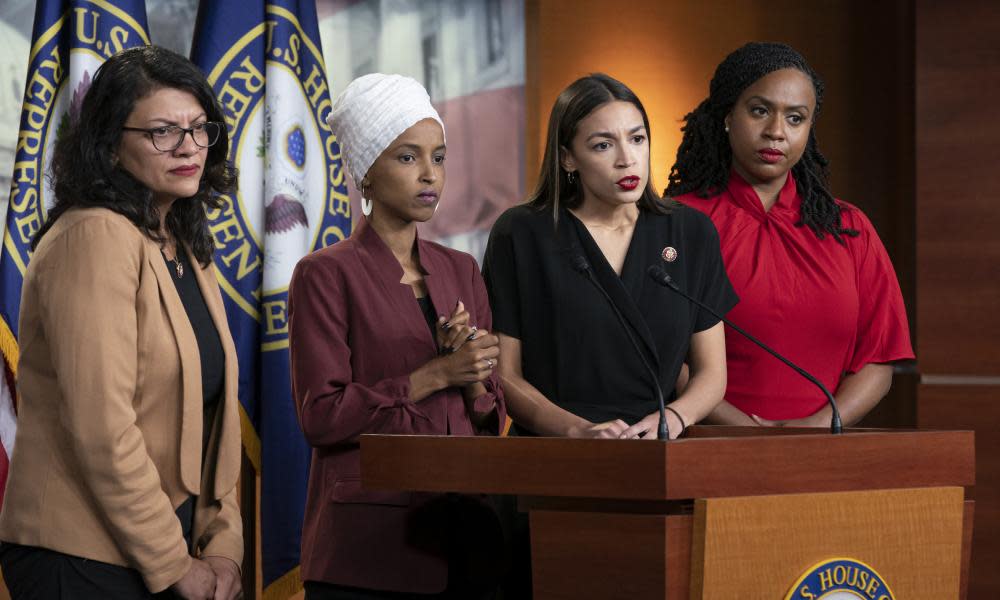There's an old word for Trump's brand of nationalism: 'hatriotism'

Several weeks ago, as President Trump used the pretext of patriotism to unleash a nativist assault on four Democratic women of color in Congress, I was inspecting a sewer. By which I mean that I was doing historical research into Gerald LK Smith.
For the mercifully uninitiated, Smith was a kind of proto-Trump in the 1930s and 1940s. An all-purpose racist, antisemite, and Red-baiter, Smith founded the America First political party and espoused a “Christian Nationalist Crusade”. One biographer described his speeches as “a combination of high school pep rally and a Klan cross burning”.
In an episode that anticipated Trump’s recent rhetoric treating representatives Ilhan Omar, Alexandria Ocasio-Cortez, Rashida Tlaib, and Ayanna Pressley as disloyal foreigners and telling them to “go back home” – even though all are American citizens and all but Omar were born here – Smith told a whooping crowd, “If the Jews don’t like our country, they can go back where they came from!”
As I slogged through such muck, I found a 1945 article from the New York Herald Tribune. It recounted Smith and similarly minded demagogues trying to crash a United Nations conference in San Francisco. Describing Smith’s crew, both the headline and the story used the word “hatriots”.
That term, a pithy conflation of “hate” and “patriots”, struck me as perfectly suited to our current moment. Read in the context of Smith’s divisive career, the word clearly referred to people who wrap toxic intolerance in the perfumed cloak of patriotism.
Clearly, “hatriots” is an epithet we need now. My curiosity about the word’s source led me not only through online searches of Google, newspapers.com, and ProQuest but into contact with several experts on hate speech and what one might call forensic etymology.
Two scholars – Mark Pitcavage, a senior research fellow at the Anti-Defamation League’s Center on Extremism, and Fred Shapiro, editor of the authoritative Yale Book of Quotations – separately traced “hatriot” to the same citation: an unsigned editorial column on page 11 of the Seymour, Indiana, Tribune on 2 July 1941. The article had no byline and it seems to have been syndicated to other small newspapers, because over the next week it appeared verbatim in papers in Sayre, Pennsylvania, and Billings, Montana, among other places.
Related: Trump gets it wrong on mass shootings, but Republicans deserve the blame
In that first iteration, the anonymous writer explained “hatriot” in almost bemused terms as just one then recent example of portmanteaus like “Republocrat”. By the mid-1940s, though, writers were using “hatriots” in a more specific way – to identify, among others, Nazi sympathizers charged with sedition and opponents of nonwhites serving in the US military.
Such examples still left the provenance vague. But an unsigned column in the Indianapolis Star on 10 July 1945 enticingly noted: “A coast commentator saluted a Manhattan gazette for coining the word ‘hatriots’ to describe rabble-rousing ‘Patriots’.” Nine years later, a spate of articles ascribed “hatriots” to Walter Winchell, the popular columnist.
That detail brought me to Neal Gabler, author of the acclaimed biography Winchell: Gossip, Power and the Culture of Celebrity. As Gabler reminded me, Winchell was an early and outspoken opponent of the Nazis and their American supporters and he considered ridicule one of his cudgels, most famously in his invented insult “Ratzis”.
“‘Hatriot’ sounds exactly like the kind of word Walter Winchell would have coined, and he certainly had no affection for the rightwingers of his day, including Gerald LK Smith,” Gabler explained. “But I don’t recall ever coming upon that particular word, and I have dug through my notes as best I could, and didn’t find it.”
“Hatriots” fell out of common parlance beyond the 1950s. Despite the rising tide of Islamophobia, antisemitism, and racism over the past decade, as documented by hate-crime statistics, “hatriot” has re-emerged only sporadically to characterize the contemporary right. I’ve found it on a blog called AmericanHatriots, in a Daily Beast article by John P Avlon, and on the radio shows and website of the political commentator David Pakman. And, oh yes, there’s a thrash metal band called Hatriot.
The time is overdue for the return of “hatriot” to the political vocabulary. Words are weapons, and “hatriot” is a weapon that neatly names and describes some of the most dangerous forces on the American landscape.
Rightwingers have long known how to name-and-shame their opponents. Think of “libtard”, “feminazi” and “snowflake”. Progressives need similar ammunition. Consider how much impact the snarky nickname and hashtag MoscowMitch has already had on Senator McConnell, providing both a slogan and a platform for trying to defeat him in 2020.
The historically accurate descriptors of the Trump movement – “white nationalism”, for instance – just don’t have the necessary zing. And correctly referring to the president as racist is almost taken as a compliment by some elements of his base, proof that only Trump can speak the unutterable truth. So it is time to revive “hatriot” and make it go viral.
“It’s useful to be able to name a phenomenon, like the politics of Trump, that combines two ideas into a toxic mix,” said Kenneth Stern, director of the Bard Center for the Study of Hate. “‘Hatriotism’ is the perfect shorthand.”
Samuel G Freedman is a journalism professor at Columbia University, a former New York Times columnist, and the author of eight books

